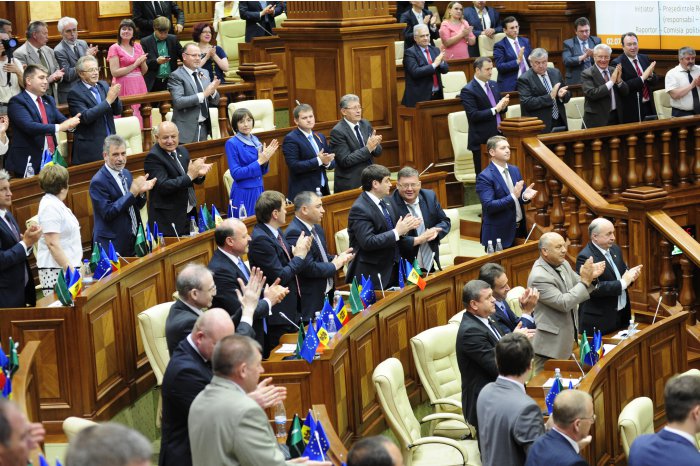2 July 2014. Moldovan Parliament ratifies Association Agreement with European Union
13:02 | 01.07.2021 Category:
For ex-communist countries, the European Union has always been a model of development, and joining this community - a major goal, except when there were marginal parties or those oriented exclusively to the eastern space.
In the Republic of Moldova, the communists initially declared their intention to gradually integrate into the European Union. Moldova undertook a roadmap, which included political, legal and economic reforms. Many things, especially in the legislative field, have been achieved, but, as usual, the inconsistency and inconsistency of politicians has not allowed us to make much progress.
And the European Union, with its huge potential, was extremely attractive. As a result of its evolution over almost seven decades, the EU has become a political and economic union of 27 states. The community area has 4,233,262 km2 and an estimated population of approximately 447 million. The EU economy and market has gradually been unified through a standardized system of laws, which applies in all Member States. The free movement of persons, goods, services and capital within the internal market is ensured in the Community, legislation in the field of justice and home affairs is adopted and common policies on trade, agriculture, fisheries and regional development are maintained. For travel within the Schengen area, passport control has been removed. In 1999, a single money market was established in which the euro is used.
For the Republic of Moldova, the proximity to the European Union has obvious advantages. First of all, it is a huge market with a large payment capacity for Moldovan products. Secondly, the EU has a predictable trade policy and there are no political obstructions here for our products. Third, the European space has become a favorite destination for the Moldovan workforce and tourism.
But the most important thing is the need for our country to undertake reforms on the separation of powers, the creation of independent democratic institutions, respect for human rights and the construction of a functioning market economy, based on the principle of free competition. This model is gradually accepted by the majority of Moldovan citizens, who do not conceive of the existence of an authoritarian regime in their country.
At the Vilnius Eastern Partnership summit, Georgia, Moldova and Ukraine were planning to initial the Association Agreement with the EU. At the last minute, after strong external pressure, Kiev suspended its decision to sign the document. Georgia and Moldova initialed the Agreement and also won a Free Trade Agreement, which opened up a huge market and key prospects for economic integration into the Community in the face of its modest economies.
Iurie Leanca, the Prime Minister of the Republic of Moldova, who initialed the Association Agreement with the EU, said immediately after the summit that we "have no right to compromise or hesitate to achieve our main goal - to become a member with full rights of the great family of the European Union. We know how demanding this course is and we do not underestimate the difficulties in any way. But we have no doubt about our determination. Everything will be done to reform and modernize Moldova. "
The text of the Agreement was subsequently translated into the official languages of the Member States. Within about 6 months, all EU member states approved the Vilnius Agreement. A new European Council decision followed, representing EU member states. Once approved, this Agreement was officially signed by the Republic of Moldova and the EU. The final stage of the process is known as ratification: after signing, the Association Agreement was to be ratified by the Parliament of the Republic of Moldova.
On 28 June 2014, the Cabinet of Ministers approved the draft law for the ratification of the Association Agreement between the Republic of Moldova, on the one hand, and the European Union, on the other hand, signed on 27 June 2014 in Brussels.
On July 2, 2014, the Association Agreement between the Republic of Moldova and the European Union was ratified in the plenary of the Legislature.
59 members out of a total of 101 voted in favor of the document. The communist opposition left the meeting room before the bill was put to the vote. The Socialists voted against. The vote was by roll call. Each Member announced from the microphone what his or her voting option was.
The head of state, Nicolae Timofti, had a sharp attitude in favor of the Agreement. He mentioned that “we need this Agreement with the European Union to carry out the primary tasks that lie ahead: strengthening democratic institutions, fighting corruption, modernizing the economy, developing infrastructure, improving public services, etc. But first of all, the conclusion of the Association Agreement will confirm at official, political level, which is an axiom for everyone - namely that the Republic of Moldova is a country with an eminently European vocation ", concluded President Nicolae Timofti.
Unfortunately, the evolution of subsequent events did not allow a rapid rise of the Republic of Moldova to the proposed objectives. Important external factors, internal sabotage by certain political forces, the plundering of the banking system and other negative things have tarnished the country's image and slowed down a seemingly inevitable path. The frequent change of geopolitical orientations grinds the country's economy, its image in the world, but also the trust of the citizens. The example of the countries consistent in achieving the proposed objectives is one to be followed by the Republic of Moldova in order not to completely exhaust its resources and to permanently bury the hopes.

